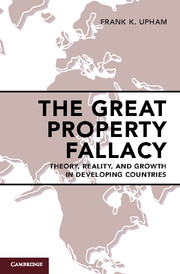Book contents
- Frontmatter
- Dedication
- Contents
- Preface
- Acknowledgments
- 1 Introduction
- 2 Physics Envy: Property Rights in Development Theory
- 3 Property and Markets: England and America
- 4 Property and Politics: Japan
- 5 Law and Development without the Law Part: China
- 6 Theory in Action: Cambodia
- 7 Property Rights and Social Change
- Index
1 - Introduction
Published online by Cambridge University Press: 19 January 2018
- Frontmatter
- Dedication
- Contents
- Preface
- Acknowledgments
- 1 Introduction
- 2 Physics Envy: Property Rights in Development Theory
- 3 Property and Markets: England and America
- 4 Property and Politics: Japan
- 5 Law and Development without the Law Part: China
- 6 Theory in Action: Cambodia
- 7 Property Rights and Social Change
- Index
Summary
This book is about the role of property law in development. It challenges the ubiquitous and rarely questioned assertion that legal property rights are necessary to economic growth and argues that this view is incomplete, misleading, and dangerous. It is incomplete because economic growth can and has occurred without property rights. It is misleading because it implies that property rights per se will invariably contribute to economic growth when in fact the role of property rights in growth is contingent on the surrounding social, political, and technological context. It is dangerous because a failure to recognize the complexity of property rights will mislead policymakers in their attempts to bring the world's poorest people out of poverty.
The faith in legal property rights emerged from neo-institutional economics, particularly from the work of Ronald Coase, Harold Demsetz, and Douglass North and their emphasis on the necessity of certain social structures for productive investment and exchange. They took a broad view of the types of institutions needed, as have many legal scholars. They expressly included custom and community norms, but the practitioners who later turned theory into policy narrowed the focus to the formal institutions of the legal system: legal rights found in statutes or judicial opinions and defined, amended, and enforced by courts and other institutions working under legislative and judicial authority. In doing so, these policymakers ignored the broader early approach and distorted the basic theory, but this focus on formal norms and institutions supported by rule of law rhetoric has nonetheless been ubiquitous since the 1980s. It has provided the policy justification for spending hundreds of millions of dollars on legal reform and formed the intellectual foundation for advice given by virtually all agencies and nongovernmental organizations (NGOs) of all political stripes engaged in development assistance across the globe. Not only has much of this investment been wasted, but the results have often destabilized existing property regimes and left societies worse off.
- Type
- Chapter
- Information
- The Great Property FallacyTheory, Reality, and Growth in Developing Countries, pp. 1 - 10Publisher: Cambridge University PressPrint publication year: 2018

